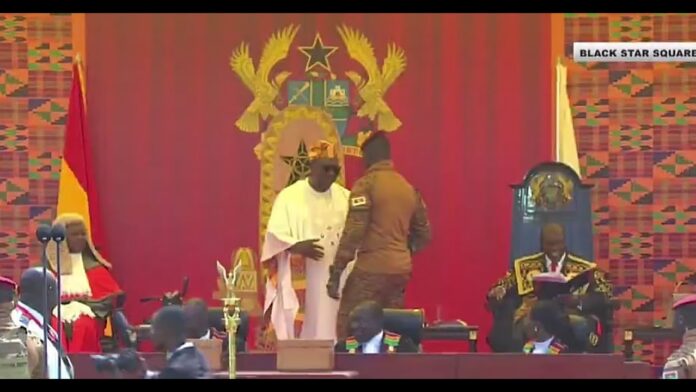Francis Ahovi, a Security analyst and Executive Secretary of Global Security for Africa Research and Good Governance (GLOSARGG), has shared his perspective on President John Mahama’s decision to allow Captain Ibrahim Traoré, the military leader of Burkina Faso, to attend his swearing-in ceremony.
Ahovi believes that Mahama took a significant risk with his image by hosting Traoré, considering the military leader was seen carrying a side firearm during the event.
Despite the controversy surrounding Traoré’s appearance, Ahovi explained that while carrying a firearm at such an event is generally against security protocols, it may have been a strategic gesture between the two leaders to promote a goal.
He suggested that Mahama’s actions were part of an effort to engage Traoré in peaceful negotiations and to encourage the acceptance of civilian rule in Burkina Faso, as well as the country’s potential re-entry into ECOWAS.
Ahovi highlighted Mahama’s willingness to take risks for the sake of peace-building, stating that Mahama believes in using negotiation to bring about change.
He further emphasized that the president’s approach, though controversial, could lead to positive outcomes, including the eventual removal of military rule in Burkina Faso.
According to Ahovi, Mahama’s actions also demonstrate Ghana’s broader foreign policy strategy of building peaceful relationships, regardless of the political nature of the leaders involved.
He underscored the importance of Ghana maintaining strong ties with Burkina Faso, especially given the shared interests between the two countries, such as the Volta Lake, and their mutual need for economic and security cooperation.
Ahovi further suggested that this incident underscores Mahama’s strategic decision to risk his own image and reputation in order to encourage a peaceful transition in Burkina Faso.
He pointed out that while some people may not understand Mahama’s decision, it represents his approach to engaging with world leaders, even those who are seen as controversial, to build relationships that foster peace.
“Before you can change someone’s behaviour, you cannot remain distant from them. You have to use all methods, including negotiations, so I think Mahama’s acceptance of Traoré on that podium – though many may not understand it – is a strategy he has used to encourage Traoré to accept civilian government, even at the risk of his safety,” said Ahovi.
He stressed that Mahama’s willingness to engage with military leaders is part of a broader peace-building strategy, which involves bringing different parties to the table to resolve conflicts and promote stability in the region. Ahovi also praised Mahama for his courage in engaging with Traoré, emphasizing that this could ultimately lead to a positive change in Burkina Faso’s political landscape.
In conclusion, Ahovi reiterated that Mahama’s efforts are focused on fostering harmony between Ghana and its neighbors, including Burkina Faso. He emphasized that despite the differences in political systems, it is crucial for countries in the region to collaborate and leverage each other’s resources to strengthen their economies and security, as well as uphold good governance.
“The relationship must continue, because if we are in harmony, we can leverage each other’s knowledge, resources, and everything we can put together to strengthen our nation’s economy and security, especially in terms of upholding good governance,” he concluded.
ALSO READ:


